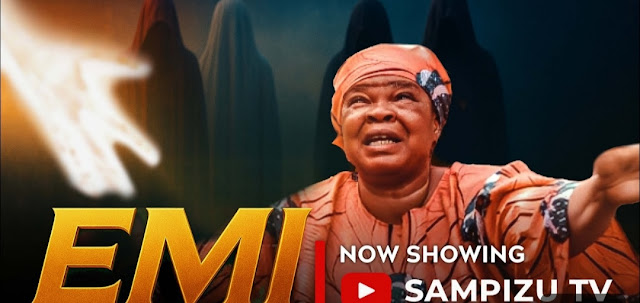| Image :YouTube |
EMI
Emi (Soul) is an emotionally charged, metaphysical journey that reaches far beyond the boundaries of a traditional Nollywood supernatural film. Rooted deeply in Yoruba spirituality, the movie explores the fragile intersection between memory, guilt, love, and the restless realm of the spirit. It is a haunting meditation on the human soul — what it remembers, what it refuses to release, and what it demands from the living.
Story and Thematic Depth
The film tells the story of a love that defies death and a soul that refuses to rest because the truth remains buried. The plot unfolds gradually, immersing the viewer in a world where emotional wounds manifest as spiritual disturbances. The screenplay is poetic and layered, built on suppressed memories and unspoken pain. Each flashback adds emotional weight, not merely explaining past events but revealing why the soul’s presence remains unrelenting.
The themes are profound:
how guilt lingers even when forgotten by the mind,
how the soul remembers what the body refuses to,
how truth becomes both a weapon and liberation,
and how love, when unresolved, can become a haunting force.
This thematic richness gives the film its intellectual spine.
Direction and Artistic Vision
The director approaches the subject matter with restraint and emotional intelligence. Rather than leaning on cheap thrills or exaggerated supernatural moments, the film builds tension through atmosphere, silence, and psychological realism. The decision to ground the spiritual elements in human emotion elevates the narrative, making the haunting feel symbolic rather than sensational.
The pacing is deliberate, reflecting the slow unraveling of hidden truths. Each scene is constructed to evoke introspection and emotional discomfort.
Acting and Character Interpretation
The performances are one of the film’s standout qualities. The lead actor captures the internal war between longing, fear, and guilt with impressive subtlety. The supernatural presence — interpreted with a blend of sorrow, quiet intensity, and emotional magnetism — adds depth rather than theatrics.
Supporting actors deliver grounded performances that reinforce the film’s psychological realism. Their reactions, skepticism, fear, and emotional detachment contribute to the world-building and cultural authenticity.
Cinematography and Visual Symbolism
Visually, Emi (Soul) is rich with symbolic language. The cinematography makes effective use of dim lighting, shadows, blurred edges, and lingering camera movements. These artistic choices create a sense of spiritual intrusion and emotional suffocation. Visual motifs — mirrors, reflections, darkness versus light, empty corridors — reinforce the film’s themes of duality, memory, and the unresolved.
The color palette, dominated by muted tones, mirrors the emotional heaviness of the narrative.
Sound, Score, and Editing
The sound design is haunting yet controlled. Whisper-like echoes, distant breaths, and gentle traditional chants are used not for jump scares, but to serve emotional truth. The score blends Yoruba musical motifs with orchestral ambience, creating a melancholy and spiritually charged soundscape.
Editing is fluid and intentional, especially during transitions between past and present, dream and reality. Scenes glide into each other seamlessly, keeping viewers emotionally anchored even in moments of supernatural distortion.
Cultural Grounding and Emotional Impact
Perhaps the film’s most impressive element is its cultural authenticity. Yoruba cosmology is treated with respect, accuracy, and artistic nuance. Concepts of consciousness, ancestral presence, and the continuity of the soul are woven naturally into the storyline, giving the film cultural and emotional power.
The final act brings the themes full circle: truth is the only force that can silence a restless soul. It is a conclusion that feels earned, haunting, and deeply human.
Verdict
Emi (Soul) is a beautifully haunting and emotionally intelligent supernatural drama that succeeds through its thematic depth, strong performances, atmospheric cinematography, and culturally grounded storytelling. It avoids cheap supernatural tropes and instead delivers a mature exploration of love, guilt, memory, and the spiritual weight of truth. Though its pacing may feel slow for viewers expecting conventional horror, its emotional richness and artistic discipline make it a standout entry in Yoruba Nollywood’s evolving supernatural genre.
⭐ Final Rating: 8.6/10
A visually haunting, emotionally layered, and culturally grounded supernatural drama that stays with you long after the screen fades to black.
If you’d like, I can produce:
✅ A shorter version
✅ A newspaper-style review
✅ A punchy social media version
#NollywoodTimes
#Nollywoodmovies
#moviereview
#Emimoviereview
#Pejuogunmola















Leave a Reply